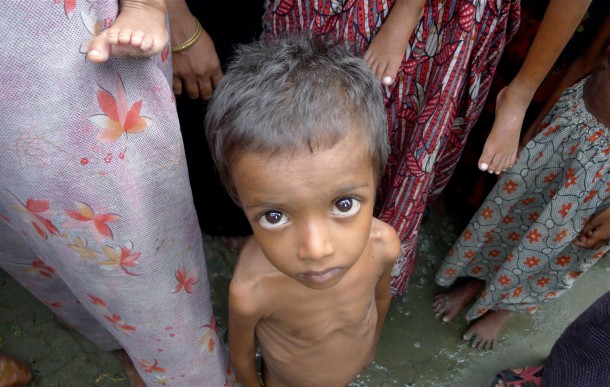U Kyaw Thar is a decent family man. He contributes to charity, helps the needy and dotes on his children. The second time we meet, he apologises for being late because he was at his son’s birthday party, and then he leaves early because his wife wants him home for dinner. He’s a decent family man.
U Kyaw Thar spends a lot of his time at the Sittwe branch of the Free Funeral Service Society, a charity dedicated to helping the less fortunate. We’re introduced one hot afternoon as a volunteers’ meeting gets underway. They’re sorting through piles of old clothes and sacks of donated food. Busy times, we’re told. The Society has been assisting refugees affected by violent clashes that rocked Rakhine state in June.
“We can help everyone,” U Kyaw Thar informs us. “Buddhist, Hindu, Christian. But no Muslim. No Muslim.”
His fellow volunteers agree. Every needy person, they explain, is deserving of sympathy, so long as he’s not Muslim, or more specifically, Bengali – their preferred word for the minority group known to the rest of the world as the Rohingya.
It’s a sentiment we hear again and again during our time in Rakhine state. The Muslim Rohingya have never been popular here – most Rahkine people see them as illegal migrants from Bangladesh and have for decades, barely tolerated their presence. But now, in the aftermath of deadly conflicts in June, the resentment appears to have morphed into an intense, almost irrational rage. The Rakhine, as a community, want the Rohingya purged from their midst.
Among politicians who matter though, there seems to be a collective burying of heads in the sand. Either that, or a willful refusal to see the crisis for what it is. Nobel Peace Laureate and democracy icon Aung San Suu Kyi has been criticized for her relative silence on the issue. In Yangon, we meet Phyu Phyu Tin, a member of Suu Kyi’s party, the National League for Democracy. She blames the situation on the lack of the rule of law in Myanmar.
“The case isn’t as serious or as big as some people outside make it out to be.”
And yet tens of thousands of Rohingya refugees are now living in atrocious conditions in squalid camps. Children are starving, even though there’s no shortage of food in Rakhine state. People inside the camps are dying of disease and illness, when Sittwe’s main hospital is just kilometres away (read about our visit to the camps here).
It’s not religious, the NDP says. It’s not about race either. The situation is complex, the issues complicated. Outsiders shouldn’t be so quick to judge. Maybe so. After all, no one knows for sure why the Rohingya are not recognized as an ethnic minority in Myanmar. Their history is the subject of much debate.
But what is clear though is that while both Rakhine and Rohingya people suffered during the conflict in June, most Rakhine Buddhists have been able to resume normal lives – no paramilitary forces have herded them into camps, no one’s restricting their movements, nobody is saying they must be expelled from the country they call home, no Rakhine child has been allowed to starve to death.
A man-made humanitarian crisis is growing inside the Rohingya refugee camps. A crisis that, if not endorsed, is at least not discouraged by good people like U Kyaw Thar and more chillingly, by quite a few Buddhist monks. At the Grike Chay Monastery in Sittwe, Abbot Ku Ma Ya tells us there can never be peace between Muslims and Buddhists. In Mandalay several days later, hundreds of monks take to the streets, calling for the deportation of Rohingya from the country. And yet, we’re told it’s not religious.
In Yangon, we meet the Secretary General of the Rakhine Nationalities Development Party. U Oo Hla Saw comes across as a thoughtful, soft-spoken man. He’s slow to condemn, careful to express regret at what he calls a sorrowful situation. Most Rohingya, he tells us, are innocent. They’ve been made use of by other Muslims.
We ask him why innocent people should have to suffer in refugee camps. He shakes his head, explains that it’s a delicate situation. And then he says, “Rakhine people have two kinds of fears. From the east, oppression by military elites. [And] from the west, the fear of Islamisation.”
The Rohingya make up about half of Sittwe. In towns like Maungdaw, they form more than 95 percent of the population. It is perhaps not hard to see why the Rakhine feel like they are being crowded out of what they view as their state. They’ve lived for decades under the thumb of the military junta. Now, in a supposedly freer, more open Myanmar, the Rakhine are making their voices heard. Ironically though, they don’t feel the Rohingya should have the same privileges.
“ We will achieve and gain our rights sooner or later,” says Rohingya politician, Win Htun Soe. “But they [the Rakhine] can’t accept this. Since they can’t accept this, they want to destroy our rights too.”
And so it seems a group of people that once faced oppression is now doing some oppressing themselves.
At the RNDP’s office in Yangon, U Oo Hla Saw’s younger, more outspoken colleague clarifies things for us.
“We don’t care about human rights, you know that? We don’t care. We only care about our identification. If we care about human rights too much, our identification will be lost, “says youth leader Khaing Kyaw Moe. “The mightiest is the survivor.”
Fear and the instinct for self-preservation. It’s a potent combination that affects even good, decent, idealistic people. No one, it appears, is immune.
“This is political,” says Win Htun Soe. “She [Aung San Suu Kyi] has to go with the majority, rather than worry about human rights.”
Watch “Nowhere To Go”, our documentary about the crisis in Rakhine state, here.
Read about our visit to the Rohingya refugee camps here.


